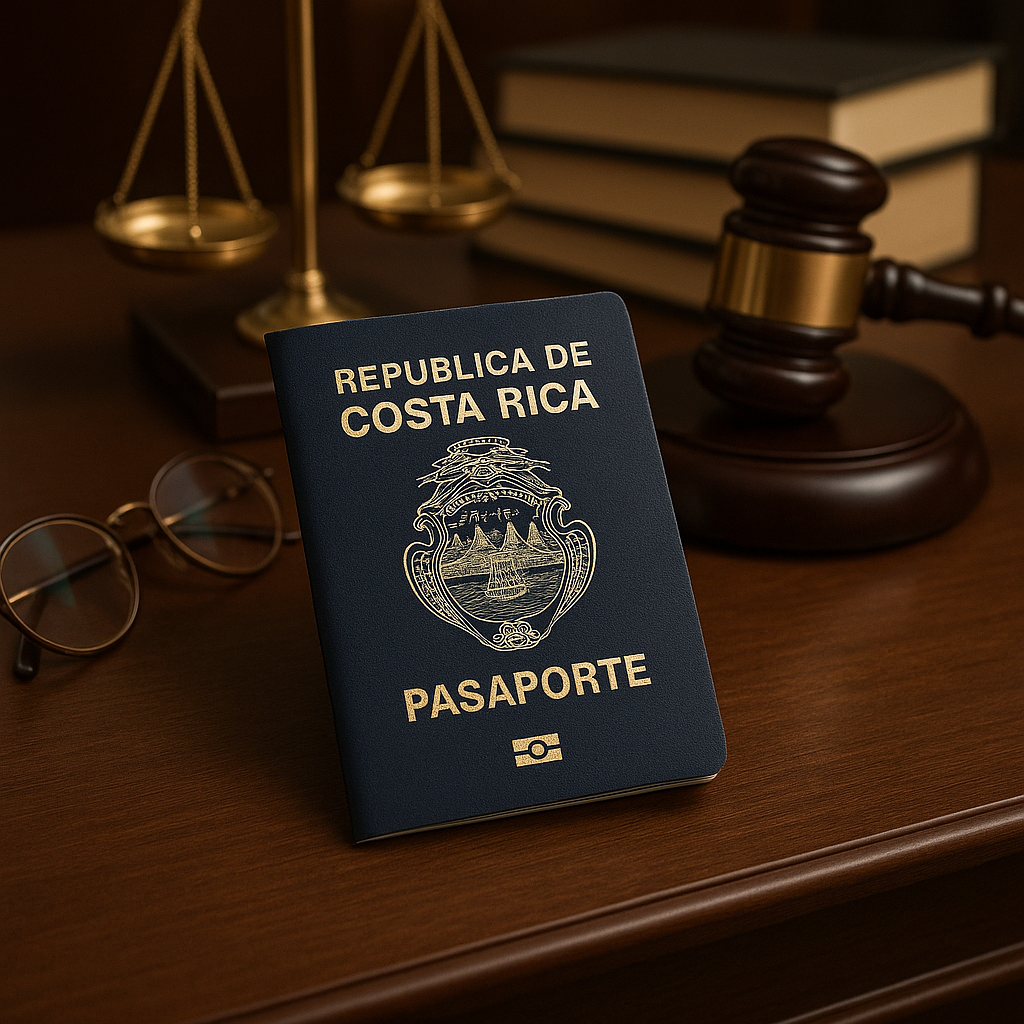How to Renounce Your Previous Nationality for Costa Rica Citizenship

Did you know that over 1,000 individuals have successfully obtained Costa Rican citizenship in recent years, drawn by the country's lush landscapes, vibrant culture, and welcoming environment? For those seeking a new life in this Central American paradise, renouncing one's previous nationality is a significant step.
Residency in Costa Rica has become increasingly appealing to individuals and families looking to enhance their quality of life. As a country known for its natural beauty and rich heritage, Costa Rica offers a unique blend of opportunities and challenges for those adopting its citizenship.
We will guide you through the complexities of renouncing your previous nationality and acquiring Costa Rican citizenship, a decision that requires careful consideration of its implications and potential consequences.
Understanding Citizenship Renunciation and Costa Rican Nationality
Costa Rica's unique distinction between nationality and citizenship is a critical aspect to grasp for those seeking citizenship. In Costa Rica, there is a clear differentiation between being a national and a citizen, with each status conferring different rights and responsibilities.
The Distinction Between Nationality and Citizenship in Costa Rica
According to the Costa Rican Constitution, anyone born within the country's borders is considered a Costa Rican national. Costa Rican nationality can also be obtained through descent, marriage to a Costa Rican citizen, or naturalization.
However, being a Costa Rican national does not automatically grant you Costa Rican citizenship. While nationals have certain rights and privileges, only citizens can fully participate in the country's democratic processes and obtain dual citizenship without renouncing their Costa Rican nationality.
Why People Choose to Renounce Their Previous Citizenship
Individuals choose to renounce their previous citizenship for various compelling reasons, including seeking a more peaceful lifestyle in Costa Rica's natural environment and tax considerations.
Some people are motivated by political stability, as Costa Rica's long-standing democratic tradition and absence of a military make it an attractive destination. Others may face restrictions on dual citizenship in their home country, forcing them to make a choice between their original citizenship and becoming a Costa Rican citizen.
Prerequisites Before Starting the Renunciation Process
Understanding the prerequisites for Costa Rican citizenship is crucial before initiating the renunciation process. Costa Rica offers various residency options to suit different needs and circumstances.
Establishing Legal Residency in Costa Rica
Costa Rica provides several residency options, including rentista residency for those with stable income, investment residency for investors, and permanent residency for long-term stays. To become a citizen, establishing legal residency is a fundamental step.
Applicants must choose a residency category that fits their situation and comply with the specific requirements for that category.
Meeting the Basic Requirements for Costa Rican Citizenship
To be eligible for Costa Rican citizenship, applicants must meet several basic requirements. These include being at least 18 years old, demonstrating good moral character through a clean criminal record, and proving financial self-sufficiency.
Additionally, applicants must show basic Spanish language proficiency and begin gathering necessary documentation early, such as birth and marriage certificates.
Costa Rica Citizenship Requirements
To become a citizen of Costa Rica, applicants must meet specific requirements that demonstrate their commitment to the country and its culture. These requirements are designed to ensure that new citizens are well-integrated into Costa Rican society and respect its values.
Residency Duration Requirements
One of the primary requirements for Costa Rican citizenship is fulfilling the residency duration. Applicants typically need to have been legal residents in Costa Rica for a certain number of years.
Language Proficiency in Spanish
Demonstrating proficiency in Spanish is crucial. Applicants must show they can communicate effectively in Spanish through a language proficiency test.
Cultural Knowledge and Integration
Costa Rica requires applicants to demonstrate knowledge of its history, culture, and traditions through a cultural knowledge test. For more information on Costa Rica's dual citizenship requirements, visit this page. Integration into society through community involvement is also valued.
Evaluating the Need to Renounce Your Previous Nationality

Evaluating the need to renounce your previous nationality is a critical step in obtaining Costa Rica citizenship. This decision is not taken lightly and involves understanding the implications and requirements associated with renouncing one's nationality.
Renouncing citizenship is a significant decision that carries far-reaching consequences. When an individual renounces their citizenship, they experience a total loss of rights and privileges associated with being a citizen of that country.
Countries That Allow Dual Citizenship with Costa Rica
Costa Rica allows dual citizenship, but the permissibility of holding dual citizenship also depends on your country of origin. Some countries permit dual citizenship without restrictions, while others may have specific conditions or outright prohibit it.
For instance, countries like the United States allow dual citizenship, whereas some countries may strip their citizens of their nationality if they acquire a foreign citizenship.
When Renunciation Is Necessary vs. Optional
Renunciation is typically necessary when your country of origin strictly prohibits dual citizenship and has mechanisms to detect when citizens acquire foreign nationality. However, some countries have specific exceptions or loopholes that may allow you to maintain dual citizenship even if it's technically prohibited.
Even when renunciation is optional, some individuals choose to renounce their previous citizenship for tax purposes, to avoid military service obligations, or for political reasons. The decision to renounce should be made after consulting with legal experts in both Costa Rica and your country of origin.
How to Renounce Your Previous Nationality for Costa Rica Citizenship
To become a Costa Rican citizen, one may need to renounce their existing citizenship, a process that requires careful consideration. The renunciation process varies significantly depending on your current nationality.
Step-by-Step Process for U.S. Citizens
For U.S. citizens, the renunciation process involves several steps. First, educate yourself on renouncing citizenship via Travel.State.Gov. Then, complete the DS-4079 form without signing or dating it. Next, notify the U.S. Embassy in San Jose to coordinate a consular interview and renunciation ceremony, attaching the completed DS-4079 to your email. The U.S. Embassy will then schedule a telephone interview, followed by an in-person consular interview and renunciation ceremony. Finally, all documentation will be sent to the U.S. Department of State in Washington DC for review.
Process for Citizens of Other Countries
Citizens of countries other than the United States must follow a different process. The first step typically involves contacting your country's embassy or consulate in Costa Rica to inquire about their specific renunciation procedures. Most countries require in-person appearances, completion of specific renunciation forms, and submission of supporting documentation such as birth certificates and current passports. Many countries also charge substantial fees for processing citizenship renunciations. The timeline for renunciation processing varies widely, ranging from a few months to over a year, so planning ahead is essential when coordinating with your Costa Rican citizenship application.
Required Documentation for Renunciation
When applying for Costa Rican citizenship, one crucial step is gathering the necessary documents for renunciation. This process involves collecting and preparing various documents to ensure a smooth transition.
Essential Forms and Paperwork
Applicants must gather several key documents, including evidence of their current citizenship, such as a passport or birth certificate. For U.S. citizens, this typically involves providing a U.S. passport or U.S. birth certificate. Additionally, bio-pages of all current foreign passports and certificates of naturalization or citizenship for any country are required.
These documents are critical for the renunciation process, as they verify the applicant's identity and citizenship status.
Authentication and Translation Requirements
All foreign documents submitted as part of the renunciation and Costa Rican citizenship application must undergo proper authentication to be legally recognized. For countries that are signatories to the Hague Convention, documents typically require an apostille from the issuing country's designated authority.
Documents from non-Hague Convention countries must go through a more complex legalization process, often involving authentication by the ministry of foreign affairs and the Costa Rican consulate in that country. Applicants must also have all non-Spanish documents professionally translated by a certified translator approved by the Costa Rican government.
Improper authentication or translation is a common reason for application delays or rejections, so attention to detail in this process is crucial for success.
The Renunciation Ceremony and Interview Process

The process of renouncing your previous nationality involves a formal ceremony that holds significant importance. As part of your journey to becoming a Costa Rican citizen, this step is both a legal requirement and an emotional milestone.
What to Expect During Your Consular Interviews
During the consular interview, you will be required to appear in person before a consular or diplomatic officer, usually at your country's embassy or consulate in Costa Rica. This is where you will formally renounce your previous citizenship. You should bring all necessary identification documents, including your current passport, which will be canceled during the ceremony but returned to you as proof of your former citizenship.
The Formal Renunciation Oath and Ceremony
The formal renunciation ceremony is a solemn event where you will take an oath explicitly relinquishing your previous citizenship. This ceremony represents a significant life transition and a permanent legal change. Following the ceremony, you will receive documentation confirming your renunciation, which is essential for your Costa Rican citizenship application.
Potential Consequences of Renouncing Your Previous Citizenship
As you contemplate obtaining Costa Rican citizenship, it's essential to be aware of the potential consequences of renouncing your existing citizenship. Renunciation is a significant decision that affects various aspects of your life, from legal obligations to financial responsibilities.
Legal and Travel Implications
Renouncing your previous citizenship can have significant legal and travel implications. For instance, you may lose the right to live or work in your former country without a visa. Additionally, renunciation may affect your ability to travel freely, as your new citizenship may not offer visa-free access to countries you previously visited without restrictions.
It's also crucial to understand that renunciation does not exempt you from certain legal obligations, such as military service or outstanding legal issues in your former country.
Tax and Financial Considerations
The tax implications of renouncing your citizenship can be complex and vary significantly depending on your country of origin and its tax treaties with Costa Rica. For U.S. citizens, renunciation may trigger an exit tax on worldwide assets if certain criteria are met, potentially resulting in significant financial consequences.
Furthermore, renunciation can affect your retirement benefits, social security entitlements, and pension distributions from your former country. Financial accounts in your former country may also be subject to different regulations or restrictions once you're no longer a citizen.
Benefits of Obtaining Costa Rican Citizenship
Acquiring Costa Rican citizenship opens up a world of opportunities for travel, business, and personal growth. As we explore the advantages of becoming a Costa Rican citizen, it becomes clear that this status offers numerous benefits that can significantly enhance one's quality of life.
Healthcare and Education Advantages
Costa Rican citizenship grants access to the country's renowned healthcare system, known for its high quality and affordability. Citizens also benefit from the country's well-regarded education system, which provides opportunities for personal and professional development. For more information on the benefits of living in Costa Rica, you can visit this page to learn more about residency.
Visa-Free Travel and Business Opportunities
Costa Rica citizenship provides visa-free or visa-on-arrival access to over 100 countries worldwide, making international travel convenient for both personal and professional purposes. Additionally, as a citizen, you can take advantage of Costa Rica's business-friendly environment, favorable tax policies, and incentives that make it an ideal destination for entrepreneurs and investors.
With Costa Rican citizenship, individuals can own and operate businesses without the restrictions faced by foreign investors, opening up new entrepreneurial opportunities. Citizens also enjoy unrestricted access to Costa Rica's banking system and financial services, making it easier to manage finances and secure loans.
Alternative Paths to Costa Rican Citizenship
For those seeking Costa Rican citizenship, several alternative routes are available beyond the standard naturalization process. Costa Rica offers a variety of residency options to suit the needs and circumstances of applicants.
Citizenship by Descent or Ancestry
Costa Rica offers an alternative route to citizenship through ancestral descent. If you have a parent, grandparent, or great-grandparent who was a Costa Rican citizen, you may be eligible for citizenship by descent. This pathway allows individuals to acquire Costa Rican citizenship based on their familial connection to a Costa Rican ancestor.
Investment and Special Category Options
Costa Rica provides special investment programs that can accelerate your path to permanent residency and eventual citizenship. The Investor Residency program, for example, allows foreign nationals who invest in Costa Rican businesses or real estate to obtain residency. After maintaining investor residency for the required period, you can apply for permanent residency and eventually citizenship. Special categories for retirees and those with guaranteed income also provide alternative paths to residency that can lead to citizenship.
Working with Immigration Experts for a Smooth Process
The process of renouncing your previous nationality for Costa Rican citizenship requires careful consideration and professional guidance. We strongly recommend working with specialized immigration experts who understand both Costa Rican citizenship laws and the renunciation requirements of your home country.
Professional immigration consultants can save you significant time and prevent costly mistakes by guiding you through the complex documentation requirements and procedural nuances. An experienced attorney can help you evaluate whether renunciation is truly necessary in your case or if there are alternative paths to achieving your immigration goals.
For personalized assistance with your Costa Rican citizenship journey, consider contacting reputable immigration services like JAROS CR at info@jaroscr.com or +(506) 7182 8969, who specialize in helping foreign nationals navigate these complex processes.
Conclusion
As we conclude our comprehensive guide on renouncing your previous nationality for Costa Rican citizenship, it's essential to reflect on the significance of this life-changing decision. We've provided a detailed roadmap to help you navigate this complex process.
Renouncing your previous nationality is a permanent decision that should be made after thorough research and consultation with legal experts. The benefits of Costa Rican citizenship, including excellent healthcare, education, and visa-free travel, make it an attractive option for those committed to making Costa Rica their home.
Carefully weigh the potential consequences against the benefits, considering your personal, financial, and family circumstances before proceeding with your application for Costa Rican citizenship.


